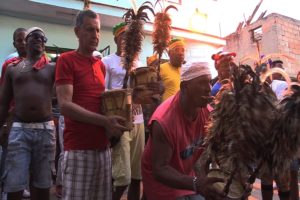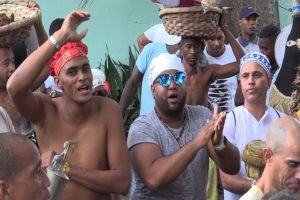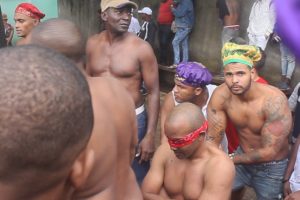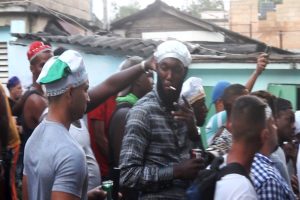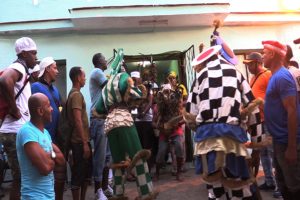 LA VERSIÓN AFRO-CUBANA DE LA MASONERIA: LA SOCIEDAD ABAKUA.
LA VERSIÓN AFRO-CUBANA DE LA MASONERIA: LA SOCIEDAD ABAKUA.
La Sociedad Abakuá, también conocida a veces como Nañigo, es una fraternidad iniciática de hombres afrocubanos o sociedad secreta, que se originó a partir de asociaciones fraternales en la región de Cross River en el sureste de Nigeria y el suroeste de Camerún.
Conocido generalmente como Ekpe, Egbo, Ngbe o Ugbe entre los grupos multilingües de la región, se creía que los Ñáñigos, como se les conoce a los miembros, podrían transformarse en leopardos para acechar a sus enemigos. En el Haití contemporáneo, donde las sociedades secretas se han mantenido fuertes, una rama de élite del ejército que se creó para infundir miedo en las masas inquietas se llamaba Los Leopardos. Entre los actos de venganza menos místicos de Ñáñigo estaba la capacidad de entregar a las personas a esclavistas. En África, eran operadores notorios que habían hecho tratos regulares para obtener ganancias con los esclavistas.
Se cree que el término cubano creolizado Abakuá se refiere al área de Abakpa en el sureste de Nigeria, donde la sociedad estaba activa. Las primeras sociedades de este tipo fueron establecidas por africanos en la ciudad de Regla, La Habana, en 1836. Esta sigue siendo el área principal de implantación de Abakuá, especialmente el distrito de Guanabacoa en el este de La Habana, y en Matanzas, donde la cultura afrocubana es vibrante.
El Abakua reconoce la virilidad, la respeta y la exalta. Quizás eso explica los preceptos sociales que acompañan la aceptación para la iniciación en esa sociedad masculina. El juramento parece ser hoy un fenómeno social que se fortalece en los hombres jóvenes; La decisión de hacerlo es gratuita y voluntaria.
PRINCIPIOS QUE GOBIERNAN A UN ABAKUA.
Para ser aceptado, se requiere un patrocinador que jure que el candidato de iniciación mantiene los principios que gobiernan un abakua: ser un hombre, un buen hijo y un buen amigo. Además, la persona está sujeta a un proceso de verificación de su comportamiento social y familiar y sus principios morales.
Después de ser aceptado formalmente, el individuo (así es como se llama al solicitante de ser abakuá), debe pagar un costo de 200 CUC por el derecho de iniciación.
Después de la ceremonia de iniciación, que consiste en el juramento, los solicitantes son consagrados como obonekue o eco, luego llega la fiesta que termina con la procesión y se come la carne de cabra.
El pequeño diablo, un personaje enigmático, dirige la procesión, baila y purifica el ambiente para ahuyentar a los espíritus malignos; Detrás de él está Isué, el sacerdote, que sostiene con sus dientes la cresta de un gallo y en sus manos el tambor eribo. Le siguen tres grandes dignatarios de la sociedad, mientras que un oficiante extiende un poco de agua bendita con ramas de albahaca que eliminarán cualquier negatividad del lugar.
Estos ritos atraen la atención de muchos, quienes se acercan para compartir la música, los bailes y las bebidas. Otros, temerosos, no quieren que se les informe sobre estos hombres catalogados como diabólicos. Rechazan esa liturgia porque, según afirman, siempre termina con violencia o criminalidad.
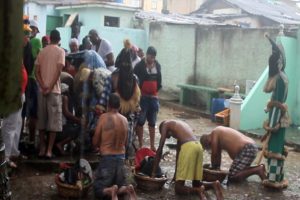 AFRO-CUBAN VERSION OF FREEMASONRY: THE ABAKUA SOCIETY.
AFRO-CUBAN VERSION OF FREEMASONRY: THE ABAKUA SOCIETY.
The Abakuá Society, also sometimes known as Nañigo, is an Afro-Cuban men’s initiatory fraternity or secret society, which originated from fraternal associations in the Cross River region of southeastern Nigeria and southwestern Cameroon.
Abakuá has been described as “an Afro-Cuban version of Freemasonry”.
Known generally as Ekpe, Egbo, Ngbe, or Ugbe among the multi-lingual groups in the region, it was believed that Ñáñigos, as the members are known, could be transformed into leopards to stalk their enemies. In contemporary Haiti, where secret societies have remained strong, an elite branch of the army that was set up to instill fear in the restless masses was named The Leopards. Among the less mystical Ñáñigo acts of revenge was the ability to turn people over to slavers. In Africa, they were notorious operators who had made regular deals for a profit with slavers.
The creolized Cuban term Abakuá is thought to refer to the Abakpa area in southeast Nigeria, where the society was active. The first such societies were established by Africans in the town of Regla, Havana, in 1836. This remains the main area of Abakuá implantation, especially the district of Guanabacoa in eastern Havana, and in Matanzas where Afro-Cuban culture is vibrant.
The Abakua recognizes manhood, respects and exalts it. Perhaps that explains the social precepts that accompany acceptance for initiation into that masculine society. Being sworn in seems today to be a social phenomenon that takes strength in young men; the decision to do so is free and voluntary.
PRINCIPLES THAT GOVERN AN ABAKUA.
In order to be accepted, a sponsor is required who swears that the initiation candidate keeps the principles that govern an abakua: being a man, a good son and a good friend. In addition, the person is subjected to a verification process on his social and family behavior and his moral principles.
After being formally accepted, the indísime (this is how the applicant to be an abakuá is termed), must pay a cost of 200 CUC for the right to initiation.
After the initiation ceremony, consisting of the oath, the applicants are consecrated as obonekue or echo, then comes the party that ends with the procession and the goat meat is eaten.
The little devil, an enigmatic character, directs the procession, dances and purifies the environment to scare away evil spirits; Behind him is Isué, the priest, who holds with his teeth the crest of a rooster and in his hands the eribo drum. He is followed by three great dignitaries of the society, while an officiant spreads some holy water with basil branches that will take away any negativity from the place.
These rites attract the attention of many, who approach to share the music, dances, and drinks. Others, fearful, do not want to be told about these men cataloged as diabolical. They reject that liturgy, because, they claim, it always ends with violence or criminality.
Agencies/ Wiki/ HavanaTimes/ Elio Delgado/ Internet Photos/ Arnoldo Varona/ www.TheCubanHistory.com
THE CUBAN HISTORY, HOLLYWOOD.



